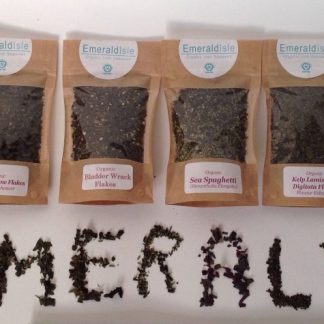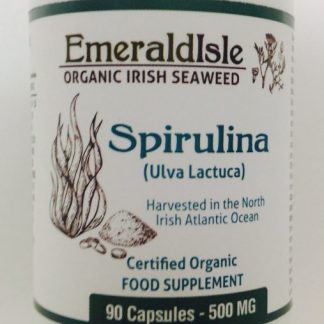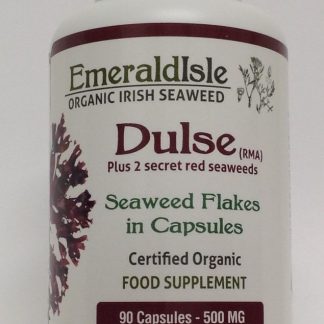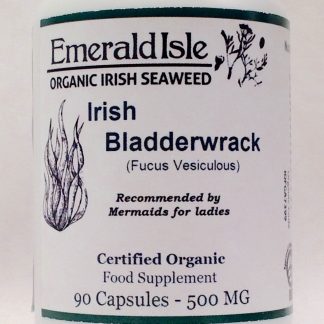Description
Emerald Isle Seaweed Organic Bladder wrack capsules (500mg) 90 capsules.
Total of 45 grams of pure 100% Bladderwrack (Fucus Vesiculosus) in 90 capsules.
Total iodine content of 250 mcg in each capsule. Serving Size 1-2 tablet (HPMC capsule) Suitable for vegetarians and vegans. Use as a dietary supplement for adults.
Take one or two Bladder wrack capsules daily, preferably with food, or as advised by a doctor or qualified nutritionist.
If you are pregnant, nursing, have any thyroid disorders, are taking any medication or have a medical condition, please consult your doctor before taking any dietary supplement.
Keep out of reach of children.
Do not take kelp capsules if you are allergic to iodine or seaweeds.
These statements are not intended as medical advice.
This product is not intended to diagnose, treat, or prevent any disease.
Store in closed package.
Use as a dietary supplement for adults.
Because of soil depletion from unsustainable farming practices, most whole foods are lacking in sufficient mineral levels necessary for human health.
Experts say!
Bladderwrack is also commonly used to maintain a healthy monthly cycle in women. In one study, bladderwrack was given to women who were determined to be at a “high risk of estrogen-dependent diseases.” and who experienced irregular monthly cycles. Conclusions from this small study were that “dietary bladderwrack may prolong the length of the menstrual cycle and exert anti-estrogenic effects in pre-menopausal women.
Further, these studies also suggest that seaweed may be another important dietary component apart from soy that is responsible for the reduced risk of estrogen-related cancers observed in Japanese populations. Christine F Skibola https://www.ncbi.nlm.nih.gov/pmc/articles/PMC514561/
Why we should all eat seaweed, the iodine debate!
From The Western Price Foundation https://www.westonaprice.org/health-topics/modern-diseases/the-great-iodine-debate/
The consumption of seaweeds has increased in recent years. However, their adverse and beneficial effects have scarcely been studied. Two extracts from the brown seaweed Fucus vesiculosus containing 28.8% polyphenols or 18% polyphenols plus 0.0012% fucoxanthin have been obtained and studied to determine their toxicity in mice and rats and also their antioxidant activity.
Both extracts were shown to lack any relevant toxic effects in an acute toxicity test following a 4 week daily treatment in rats. The extracts exhibited antioxidant activity in noncellular systems and in activated RAW 264.7 macrophages, as well as in ex vivo assays in plasma and erythrocytes, after the 4 week treatment in rats.
Our ex vivo results indicated that compounds from extract 2 may be more easily absorbed and that the antioxidants in their parent or metabolized form are more active. These findings support the view that the daily consumption of F. vesiculosus extract 2 (Healsea) would have potential benefits to humans.
by J. Agric. Food Chem., 2008, 56 (17), pp 7773–7780
DOI: 10.1021/jf8007053
Publication Date (Web): August 07, 2008
Copyright © 2008 American Chemical Society
Please see the link from the BBC talking about the health benefits of seaweed.
http://www.bbc.co.uk/news/health-26043954
GOVERNMENT GUIDELINES ON SAFE IODINE IN TAKE
The World Health Organisation considers 1100 mcg iodine per day to be the safe upper limit.
The US Institute of Medicine has set 1100 mcg iodine per day as a safe upper limit.
The UK Department of Health recommends that a daily intake of 1000 mcg iodine should not be exceeded.
However, there is a lot of controversy over these fairly arbitrary figures, and an amount of iodine by a person’s weight has also been proposed. The allowance for a person who weighs 80 kg would be 2400 micrograms per day (mcg/day) nearly 4 grams of Ascophyllum.





